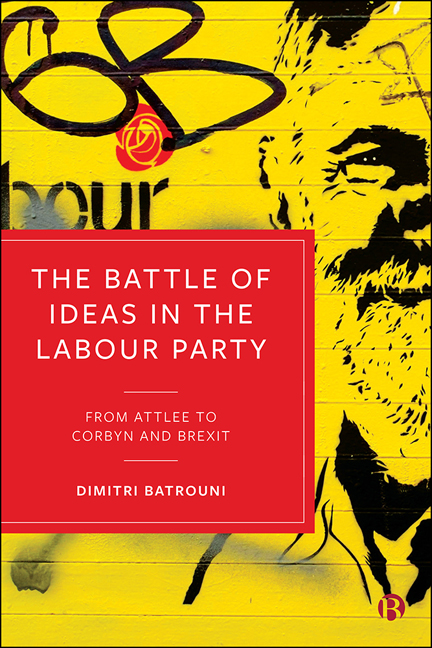Book contents
- Frontmatter
- Contents
- List of Abbreviations
- Acknowledgements
- Introduction
- 1 The Battle of Ideas in the Labour Party, 1945–92
- 2 The Rise of New Labour: Electoral Concerns Trump Ideology
- 3 Bridging the Divide: Ed Miliband and Ideas
- 4 Pre-distribution
- 5 Corbynism: The Left’s Resurgence
- 6 Corbynism: Brexit and Globalization
- References
- Index
2 - The Rise of New Labour: Electoral Concerns Trump Ideology
Published online by Cambridge University Press: 10 March 2021
- Frontmatter
- Contents
- List of Abbreviations
- Acknowledgements
- Introduction
- 1 The Battle of Ideas in the Labour Party, 1945–92
- 2 The Rise of New Labour: Electoral Concerns Trump Ideology
- 3 Bridging the Divide: Ed Miliband and Ideas
- 4 Pre-distribution
- 5 Corbynism: The Left’s Resurgence
- 6 Corbynism: Brexit and Globalization
- References
- Index
Summary
Before analyzing Tony Blair's period in opposition, John Smith's short tenure as leader of the opposition, before his untimely death, merits a brief discussion because it highlights an alternative route that could have been taken instead of New Labour. There were limited battles over ideas in the Smith and Blair eras for many reasons: Kinnock had painstakingly disempowered the left, the party was becoming increasingly disenchanted by continued electoral losses and, fundamentally, the left had nothing new to say. Their ideas had been defeated. There was one battle, however, that was relentlessly waged: the fight against the spectre and perception of ‘Old’ Labour, and its ideas, influencing New Labour. In effect, New Labour shadowboxed the left, despite its defeat, throughout its period in opposition because of concerns over its electoral ramifications. New Labour reinforced the right's institutional dominance, ensuring dissent was curtailed at every opportunity. Moreover, they had new ideas which provided wind for their sails. New Labour's institutional power, especially in policymaking, is documented below because it highlights how any battle was prevented from ever starting. New Labour were keen to stress their policy position was between New Right thinking (Thatcherism) and ‘Old’ Labour. In this endeavour, they searched for new ideas that emphasized that position.
The Smith years
Defeat in the 1992 general election was devastating. Although under Kinnock's two periods as opposition leader Labour had effectively seen off the SDP threat and increased Labour's share of the vote from 27.6 per cent in 1983 to 34.4 per cent in 1992, it was not enough (Minkin, 2014: 82). The Conservatives won 336 seats, while ‘Labour had 271 seats, an improvement of 42’ (Rubenstein, 2006: 169). After the result, Kinnock immediately resigned and triggered a leadership election. The victor was John Smith, previous Shadow Chancellor of the party. Significantly, his victory did not signal a radical change on the policy or ideas front. McSmith (1994: 312) described Smith's stance, especially on policy, as ‘masterly inactive’, stating that ‘at the moment of his [Smith’s] death, there were vast acreages of ambiguity where Labour Party policy might have been’. Seyd and Whiteley (2002: 6) reported this was because of the dominance of the ‘one last heave’ school of thought, based on the logic that the policies were essentially in place, so there was little need for active engagement with new ideas and policies.
- Type
- Chapter
- Information
- The Battle of Ideas in the Labour PartyFrom Attlee to Corbyn and Brexit, pp. 41 - 62Publisher: Bristol University PressPrint publication year: 2020



